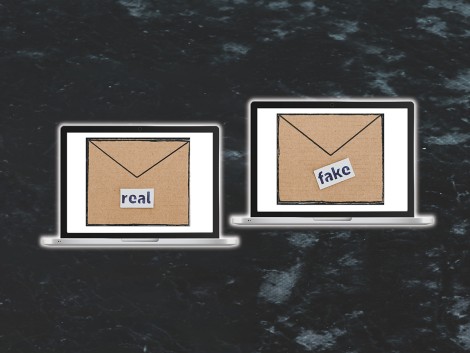Ever wonder if an email is fake? Many fraudsters send fake emails to try and trick you into doing something you shouldn’t. Check out these 7 tips to spot a fake email and to keep yourself safe from cybercriminals.
- Inspect the Email Header Info to Verify Whether the Sender’s Address is Legitimate.
The first sign of a fake email is a fake email address in the header. Many fraudsters pose as legitimate companies or people. Legitimate organizations typically send emails from email addresses containing the company’s domain after the “@” symbol. For example, abc@amazon.com. A fake email might come from public domain such as Gmail, Hotmail, Yahoo, etc., or an unknown domain name. You should also check to see if the sender’s name and name in the email address match. - Watch Out for Uncommon Uses of the Email Bcc Field
In some emails, your email address might be listed in the Bcc field instead of the recipient line. It is unusual for organizations to blind carbon copy when communicating with customers. They would directly contact you. If your email address is in the Bcc field, that is a good sign that the email is fake. - Check Whether Embedded Links Redirect to Unexpected Websites.
Another characteristic of a fake email is unexpected redirect links. Usually, links given in the email take you to the webpage that is written in the link. Scammers may trick you by switching the hyperlink to a malicious website instead. To check if the link provided in an email is legitimate, hover your cursor over the link to display the real URL or right click on the link or button and select “inspect”. This is where you can see the real URL. If they do not match, then it is a malicious link. - Pay Attention to Unusual Spelling and Grammatical Errors.
An email containing many grammar, spelling, or punctuation errors is a red flag. Companies follow strict email etiquette and editorial standards. Small typos can happen, but it is uncommon to see multiple mistakes in a single message. Do not ignore these errors. - Ask Yourself Whether the Language Seems Pushy or Urgent.
Scammers will try to trigger your emotions with their messages by tricking you into doing something you wouldn’t normally do. For example, they may send you emails on the following subjects to create a sense of urgency: deals & discounts, high-priced lottery winning, job offering, unauthorized access of your account, data breach, free credit reports, fake purchase from your account, and more. Many of these subjects trigger emotional responses, which is exactly what the scammer wants. Look for this in the subject line and wording of the email. - Ask Yourself if Email Attachments are Unsolicited or Unexpected.
A good rule of thumb when it comes to email attachments is to ask yourself: Did I ask for this information? Many scammers will send emails with phony attachments to get you to download their malicious software. They may send you invoice documents, receipts for payments, photos, pricing sheets, spreadsheets. Do not open any unknown or unexpected attachments on emails. - Be Vigilant. (Even if the Email is From a Legit Email Address)
The tips above will help you know if an email is fake when the attacks use a fake email address. But what if you get an email from a friend or relative? There are different types of malware and cyber-attacks that can corrupt a user’s device and send emails on their behalf. There is no way to define an “unusual email”, so you must use your instincts. An unusual email from a friend may ask you to send them money immediately, open a website to get a discount, donate money to an organization, reply with your personal info, or download software or an attachment. If you are unsure if the email is actually from your friend, ask them directly by phone or in person, if they sent you anything.
Scammers are becoming smarter and more innovative with their tactics to reel in their victims. Don’t fall for a fake, think before you click! If you think you’ve been a victim of fraud, or are wondering if something is legitimate, contact us at 800-423-1602.


